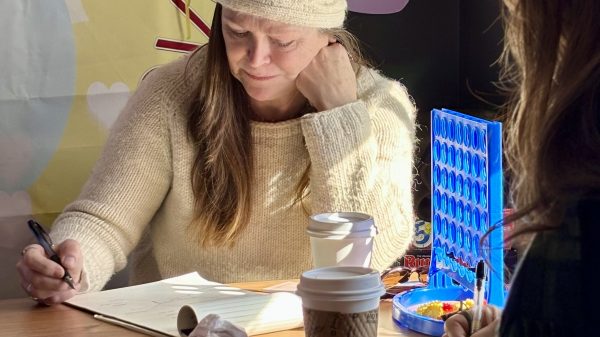The following article was produced as part of a voter guide grant from the Rural News Network. The Rural News Network consists of 80 newsrooms, including The Kent Good Times Dispatch, serving rural communities across 47 states – a subset of the more than 450 members of the Institute for Nonprofit News (INN) Network.
- Voter guide information will be published throughout October. Be sure to check back regularly and subscribe to our email list to receive updates.
- Election information for 2024, including sample ballot
- Republican state senate candidate for the 30th district
- Connecticut voters to decide on constitutional question
Everyone has felt the financial squeeze of inflation and the rising cost of living in recent years.
One Kent resident is running for state senate on a campaign of affordability to address the ever-increasing costs of housing and childcare.
Meet Justin Potter, Democratic state senate candidate for the 30th district, which includes the town of Kent. Born and raised on a dairy farm in Washington, Conn., and a graduate of Region 12 Schools, Potter is now a small business owner, father of two, and an active member of the Kent community, notably serving as the president of Kent Affordable Housing (KAH).

His top three priorities? “Affordability, affordability, affordability,” he emphasized during a Sept. 27 interview.
“Housing is an issue that has affected me personally, and lack of affordable housing is a huge issue for communities in Northwest Connecticut,” he said.
According to a recent Affordable Housing Needs Assessment by the Northwest Hills Council of Governments (NHCOG), 10,568 households across the 21 towns that NHCOG represents are housing cost burdened, spending more than 30 percent of their annual gross household income just to keep a roof over their heads.
In Kent 366 households (49 percent) are housing cost burdened.
“This is a tremendous opportunity to create meaningful and much-needed change,” Potter said of his bid for state senate and his aim to tackle affordability.
Potter explained that the Vermont Housing Improvement Program is a successful state program that offers 10-year forgivable loans and grants of up to $50,000 per rental unit to repair, add on to an existing building or create an accessory dwelling unit (ADU) on an owner-occupied property. The stipulation on use of state funds is that those units must be rented for 5 years at or below fair market rent as determined by the US Department of Housing and Urban Development.
If elected, Potter plans to introduce a proposal to create a similar program here in Connecticut, stating, “I’m not above borrowing a good idea.”
“This would give middle class homeowners the ability to create ADUs to rent out to those seeking affordable housing,” he said.
During his tenure as president of KAH, Potter has been a champion of ADUs as an affordable housing solution.
Affordable childcare is another priority of Potter’s campaign.
The all-too-familiar story of two-income families having to weigh the cost of childcare in relation to income and assess whether or not it makes sense for both adults in the household to work is at the forefront of his mind when considering this issue.
“It’s estimated that Connecticut’s economy loses $1.5 billion dollars every year due to the lack of childcare,” he said, highlighting a statistic from The CT Project Action Fund.
One of the solutions Potter would employ to lower childcare costs would be to use the state’s Childcare Trust Fund created by House Bill 5002 in 2024. An aim of this fund is to expand funding to help cover childcare costs.
“The state created this fund, but did not actually put any money into it,” Potter stated.
The bill that brought this fund to fruition passed unanimously in both chambers of the state legislature, but is currently sitting latent with a $0 budget. Potter would work to change that.
To spread his message of affordability, in recent weeks Potter has been canvassing across the district by knocking on doors.
“I see this role as very much being a representative for folks across the ideological spectrum,” he said.
Potter, a gun owner, considers himself a practical Democrat.
“I will not let ideology get in the way of solutions,” he said. “I will carefully consider the cost and trade-offs associated with pursuing important goals. I am willing to say no to local interest groups if that’s what’s needed for the greater good,” he said, reassuring those who may be on the fence about voting for him.
“We have very real and concrete needs that the state government has to address. I look forward to helping to do that,” Potter summed up.





























